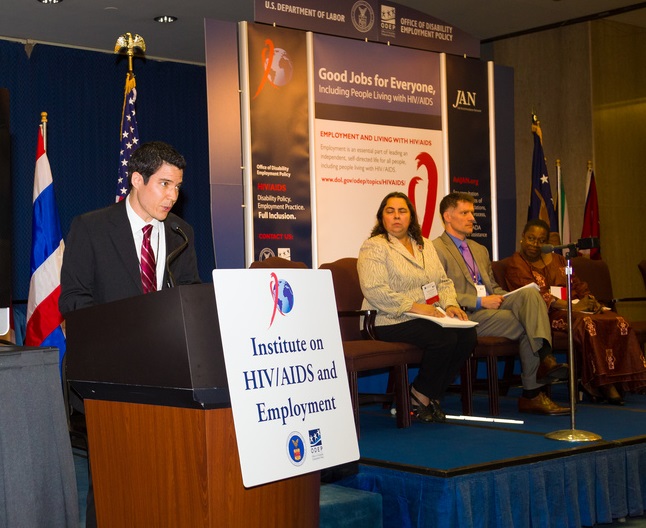
Ed. note: This is cross-posted on the U.S. Department of Labor blog. See the original post here.
Each June, the LGBTQ+ community and allies commemorate Pride Month, promoting self-affirmation, dignity, visibility, inclusion and diversity within the community. In July, the disability community and allies commemorate the anniversary of the Americans with Disabilities Act, promoting the same principles in response to a similar history of exclusion and discrimination.
These periods of commemoration are clearly connected by a matter of days on the calendar, but as communities we don’t always make the connections around our common experiences and goals. I believe the disability and LGBTQ+ communities can find strength in working together. In fact, it is these commonalities and the opportunities they present that led me to serve as chief of staff in the Office of Disability Employment Policy.
From my earliest thoughts, I knew I was different. I knew because the outside world told me so. When my mom was pregnant with me she thought she was carrying a boy and chose the name Dallas. When I was born with the external indications that I was a girl, she instead named me Lily − as I like to joke, “the most effeminate name in the book.”
As I grew I didn’t feel like a girl or what that seemed to represent. I also thought there was something wrong with me. I felt shame about what I decided would be my little (or big) secret for the rest of my life. I was teased on the playground and questioned by adults as to “what I was,” and essentially told that I did not look or act the way I was “meant” to. And, I felt camaraderie with individuals with disabilities who, like me, were excluded or made fun of for how they looked or acted. So I stuck up for them and befriended them.
It would not be for many years that I would first hear the word transgender and eventually embrace that identity, and find love, community, support and pride. Along the way, I have come to recognize the multiple intersections within our communities – from being labeled by society as “other” or somehow different from what is “normal” mentally or physically, to negotiating disclosure, to facing barriers and disparities in critical areas of life like public accommodations, housing, education, employment, the legal system and medical care. These intersections have influenced me along my academic and professional path, and the disability community has become my community.
This week I was honored to participate in the Forum on LGBT and Disability Issues at the White House, and proud to share how ODEP is building bridges between the disability community and other marginalized populations.
One of the initiatives we are working on is called Add Us In, designed to identify and develop strategies to increase employment within the small businesses for individuals with disabilities, with an emphasis on ethnic minorities, the LGBTQ+ community, women and veterans. ODEP is also working to support the National HIV/AIDS Strategy by improving employment and economic opportunities for people living with HIV, a covered disability under the ADA, which disproportionately impacts the gay, transgender, African American and Latino communities.
Through my work, I am constantly reminded that, although much remains to be done, significant progress has occurred in just the last generation, for both the LGBTQ+ and the disability communities. Going forward, we must draw strength from each other’s lessons − and remind ourselves that when one person or group is marginalized or discriminated against, we all are.
I hope to one day live in a world that truly celebrates the wide variation of the human form, condition and experience. To get there, we all have a part to play. Change does not arise from pity, shame, exclusion or low expectations. It arises from empowerment, celebration of difference, and a willingness to take risks as individuals and communities − to take pride in who we are.
Dylan Orr is chief of staff for the Office of Disability Employment Policy.


